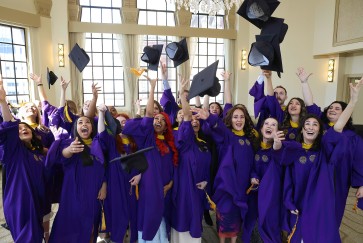This story is part of an occasional series detailing life on campus — from people and places to processes and programs. Field Guide shows you the lay of the land at Northwestern.
By the time she arrived at Northwestern, Annie Lee ’24 already planned to study abroad during her college career. What she hadn’t planned was doing it twice in one year.
The sociology and global health major was spending the fall of her junior year in Vienna, when she received a surprising email. After being canceled due to the COVID-19 pandemic, Northwestern’s Public Health & Development in South Africa program was returning that spring. She decided to apply, and a few months later, she boarded a flight to South Africa.
Her classes in both locations expanded her perspective of what public health looks like: In Vienna, professionals working in the city taught her classes. In South Africa, she took class field trips to hospitals and spoke to people with firsthand experience.
“It helped me to get a broader view of what health could mean in other places,” Lee said.
Though Lee’s second round of jet-setting might be less common, hundreds of Wildcats study abroad each year. Prior to the pandemic, between 700 and 800 students traveled abroad each year, according to the Global Learning Office (GLO), which offers credit-bearing study abroad, exchange, research and academic internship opportunities for undergraduates.
However, during the 2023-2024 academic year, more than 1,000 students studied abroad. And this year, a similar number of students are set to gain international experiences that augment their education and help prepare them for today’s complex and interconnected world.
If you want to join the ranks of Northwestern’s globe-trotting students, here’s your guide to getting started.
Can I study abroad? I heard it’s too hard for some majors to fit into their schedule.
Short answer: Yes! “With the right planning, study abroad is open to every single school and every single major at Northwestern,” said Sara McGuinn, associate director for global engagement programs at GLO, which offers support for students before, during and after their study abroad experience.
Your academic adviser and GLO advisers can help you find the best program and time to go abroad to ensure you stay on-track for graduation.
Okay, I’m interested, but where do I start?
Start by exploring your options. In the GLO portal, you can see the full list of programs. Filter by country, housing style, language prerequisites and more to narrow down the list and find the programs that best suit your needs. Not sure what you’re looking for? Try GLO’s study abroad goals assessment to help you clarify what you want to get out of a study abroad opportunity.
When McGuinn helps students narrow down their list of programs, she starts with academics.
“Ultimately, study abroad is studying; it's an academic experience, so I always want to know what's your major, what kind of credit do you need while you're abroad?” McGuinn said.
From there, you can start thinking about your personal goals. Is there a language you want to learn? A part of the world you’ve always been curious about? To continue narrowing it down, think about the characteristics you’re looking for in your experience, like types of housing, who you’ll be taking classes with and the kind of support you’ll need while abroad.




